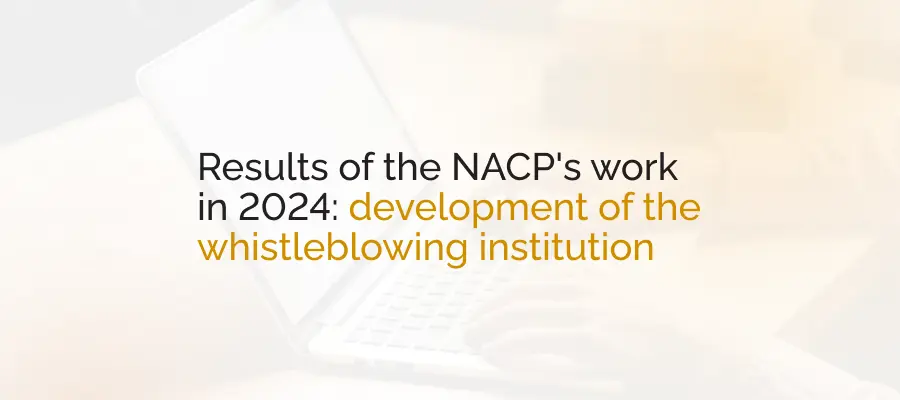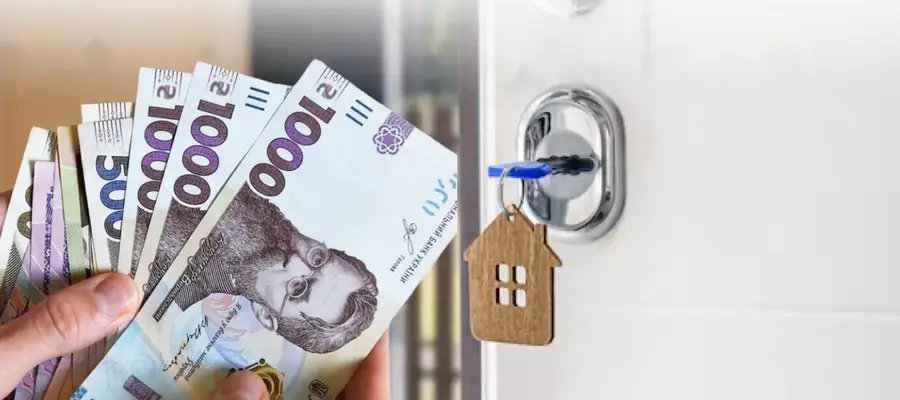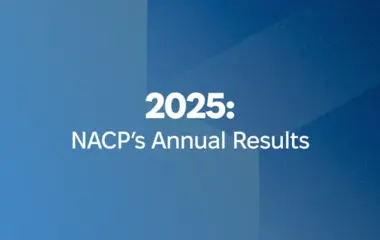In 2024, whistleblowing in Ukraine was formed and started working as a comprehensive institution. For the first time in the country's history, the National Agency on Corruption Prevention (NACP) ensured the implementation of the processes provided for by law, from filing a complaint to paying remuneration to corruption whistleblowers.
Whistleblower protection remained among the NACP's top priorities in 2024.
‘The National Agency immediately responded to any violations of their rights. During the year, ten orders were issued to eliminate violations of the law and immediately restore the whistleblowers' labour rights. Seven of them were issued for violations detected during scheduled and unscheduled inspections, and three for violations detected during inspections based on whistleblower reports. The NACP also drew up a report on administrative violation for disclosing information about a whistleblower (Article 172-8 of the Code of Administrative Offences) and initiated a court case to protect the whistleblower's labour rights. In addition, based on the NACP's materials, the State Bureau of Investigation initiated criminal proceedings for gross violation of labour legislation (Article 172 of the Criminal Code of Ukraine),’ said Anastasiia Renkas, Head of the NACP unit.
She added that in October 2024, the NACP paid the first remuneration to corruption whistleblowers. This became possible due to a change in the procedure for using the funds allocated in the state budget for the implementation of anti-corruption strategies. Regulation of future payments of remuneration to whistleblowers is one of the NACP's key tasks for 2025.
During the year, the number of organisations connected to the Unified Whistleblower Reporting Portal increased to 7,904, compared to 95 as of January 2024. To improve the effectiveness of the portal, the NACP developed guidelines and conducted an analytical study on whistleblower protection. It also amended the order on determining the order of priority for connecting to the Portal and the Procedure for its maintenance.
The National Agency held a number of public events to introduce and develop the institution of whistleblowing. These included the conference ‘Corruption Whistleblowers in Ukraine: Successes and Challenges’, a roundtable discussion on whistleblowing among military personnel, a discussion platform ‘Establishment and Development of the Whistleblowing Institution in Criminal Proceedings’, and training sessions: a certified programme for prosecutors was launched, and more than 15 trainings were held for employees of various government agencies and law enforcement officers.
At the same time, the NACP continues to work on improving the legislation on whistleblower protection. In cooperation with the Ministry of Defence of Ukraine, amendments to the Disciplinary Statute of the Armed Forces of Ukraine were developed to protect military whistleblowers. Legislation has also been amended to harmonise Ukrainian whistleblower protection standards with international ones.
‘The institution of whistleblowing in Ukraine has already proved to be an effective tool in the fight against corruption. The NACP's priorities in this area in 2025 are to initiate legislative changes to address existing gaps and improve whistleblower protection mechanisms, increase public understanding of the importance of whistleblowing and the specifics of the status, rights and guarantees of whistleblowers; modernise the Unified Whistleblower Reporting Portal; create channels for secure reporting of corruption, including information classified as a state secret; and promote the development of the whistleblowing institution to the level of standards and mechanisms provided for by the best international practices, including Directive 2019/1937 of the European Parliament and of the Council of the European Union,’ - said Serhii Hupiak, Deputy Head of the NACP.
You can read about the current development of the whistleblowing institution in Ukraine, the results of the first year of the Whistleblower Reporting Portal and what further legislative changes are needed here. You can read more about the need to regulate the status of a whistleblower in criminal proceedings here.









